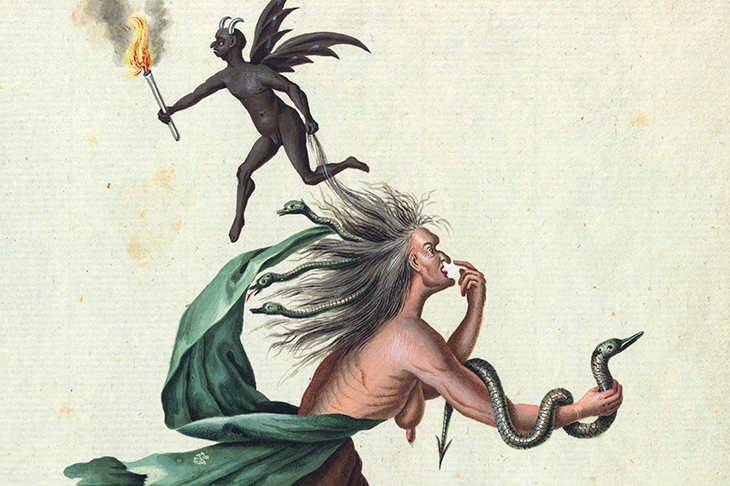In 1791, Isaac D’Israeli — father of prime minister Benjamin — published his most famous work, the Curiosities of Literature, a collection of freewheeling mini-essays on whatever literary topics happened to tickle their author’s fancy: ‘Titles of Books’, ‘Noblemen Turned Critics’, ‘On the Custom of Saluting after Sneezing’, ‘Cicero’s Puns’. One of its joys is its capaciousness — completely unsystematic, yet seeming somehow to touch a little on everything. The book is long, but the essays are rarely more than a couple of pages, sometimes less. Nothing outstays its welcome and everything is delivered in D’Israeli’s trademark style — brisk, jovial, prodigiously knowledgeable; the voice of someone who has read absolutely everything but always with an eye on rehashing it as highbrow gossip, an after-dinner speech for the literary society.
D’Israeli’s Curiosities has its antecedents (the original Spectator for one), but it might be said to have crystallised a new genre: the ragbag of literary anecdotes, unencumbered by any overarching thesis. Two centuries later, the genre is alive and well — for lovers of books, the book about books is an easy sell. The pick of this year’s crop, by a comfortable margin, is The Madman’s Library, whose subtitle — ‘The Strangest Books, Manuscripts and Other Literary Curiosities from History’ — calls back explicitly to D’Israeli. There is no hokey grand narrative to be propped up here; just a snaking roll-call of bookish oddities, organised loosely into categories — codes, hoaxes, the occult, weird science — but essentially linked simply by the fact that they are unusual and interesting.
There’s a Quran written in Saddam Hussein’s blood, and books bound in human skin, or laced with arsenic
And for the most part they are just that. There are, of course, some you’ll have heard of before: perhaps the so-called Wicked Bible of 1631, where a misprint omits the word not from the seventh commandment (‘Thou shalt commit adultery’); or maybe Yale University’s perennial crackpot-magnet, the Voynich manuscript. But like D’Israeli, Edward Brooke-Hitching doesn’t hang about, and before you know it you’re on to some new morsel. A Quran written in 50 pints of Saddam Hussein’s blood? Books bound in human skin, or laced with arsenic? The Japanese Fart Competitions scroll?
The movement really is relentless. Nothing gets more than a couple of paragraphs — many get no more than a picture and a caption — and that breakneck pace can be wearying. Brooke-Hitching writes questions for the TV series QI, and The Madman’s Library has something of that show’s worldview. Ungenerously, one might call it a cartoonish, Horrible Histories take on culture, where everything is forced into the categories of surprising, outlandish or gross. Don’t think too hard: extract the nugget of entertainment and move on. But The Madman’s Library is upfront about its freak show status — it’s there in the title — and Brooke-Hitching is a wry, likeable ring-master, threading his acts together with an arch, enjoyable erudition.
Inevitably, one finds oneself wanting to know more about some of the curios. And indeed one can. One of the curiosities of a modern Curiosities of Literature is that Wikipedia deals with much of this stuff in more detail. But take it as an exercise in Wunderkammer curation — an index of the outlandish, rather than the last word —and The Madman’s Library, bursting at the seams, is really rather wonderful.
The mixture of modern and antiquarian material is fun too. Among the demonology and scatological marginalia, Brooke-Hitching still finds room for the 1960s soft-porn romp Naked Came the Stranger. Here, the dustjacket credits the work to ‘Penelope Ashe’, but the novel was really a collaborative effort, two dozen journalists working tongue-in-cheek to produce a deliberately terrible pastiche of Harold-Robbins-style trash fiction. It sold 400,000 copies. Meanwhile, the chapter on large and small books includes Strickland Gillilan’s minimalist poem ‘Lines on the Antiquity of Microbes’: ‘Adam/ Had ’em’
Most of all, however, what distinguishes The Madman’s Library from its many modern peers is its production. It is the images — full colour on every page — that make the book a real joy. Brooke-Hitching’s prose is elegant and witty, but this is still, probably, not a book to read from start to finish. The stories pile up and start to bleed into one another. But the pictures — in their hundreds — are endlessly diverting, sending one off to find out more about George Psalmanazar’s made-up ‘Formosan’ alphabet, or the penguin-blood journal of the Blenden Hall’s shipwrecked captain, or the hand-coloured devil, behatted and red of penis, banging his drum in the 18th-century Compendium of Demonology. It is in these that The Madman’s Library comes into its own; they are where its true fascination lies.
A book to dip into, then, a visual treat and a worthy inheritor of D’Israeli: a reminder that, even after all these years, when it’s done well a book about books can still fire one’s curiosity.






Comments